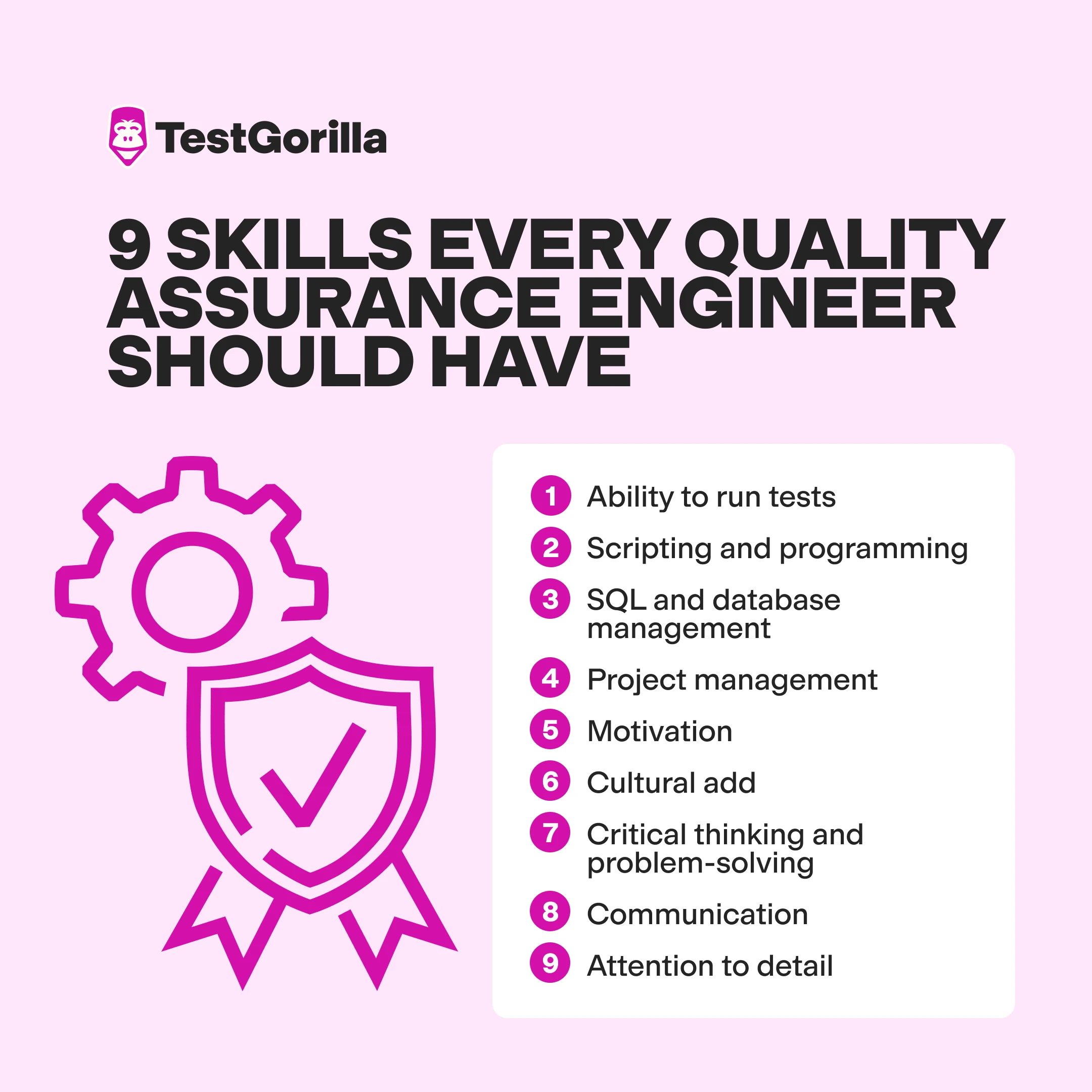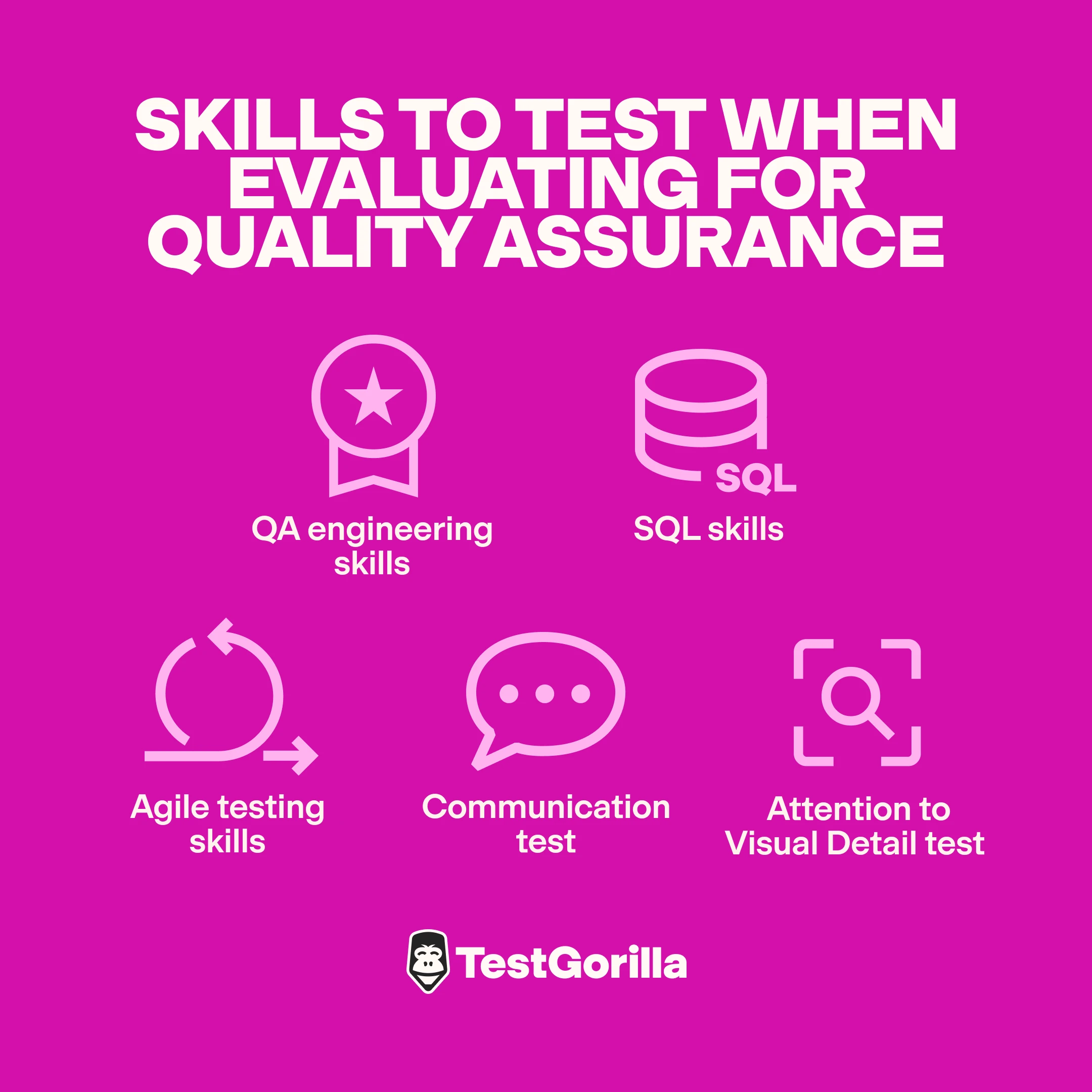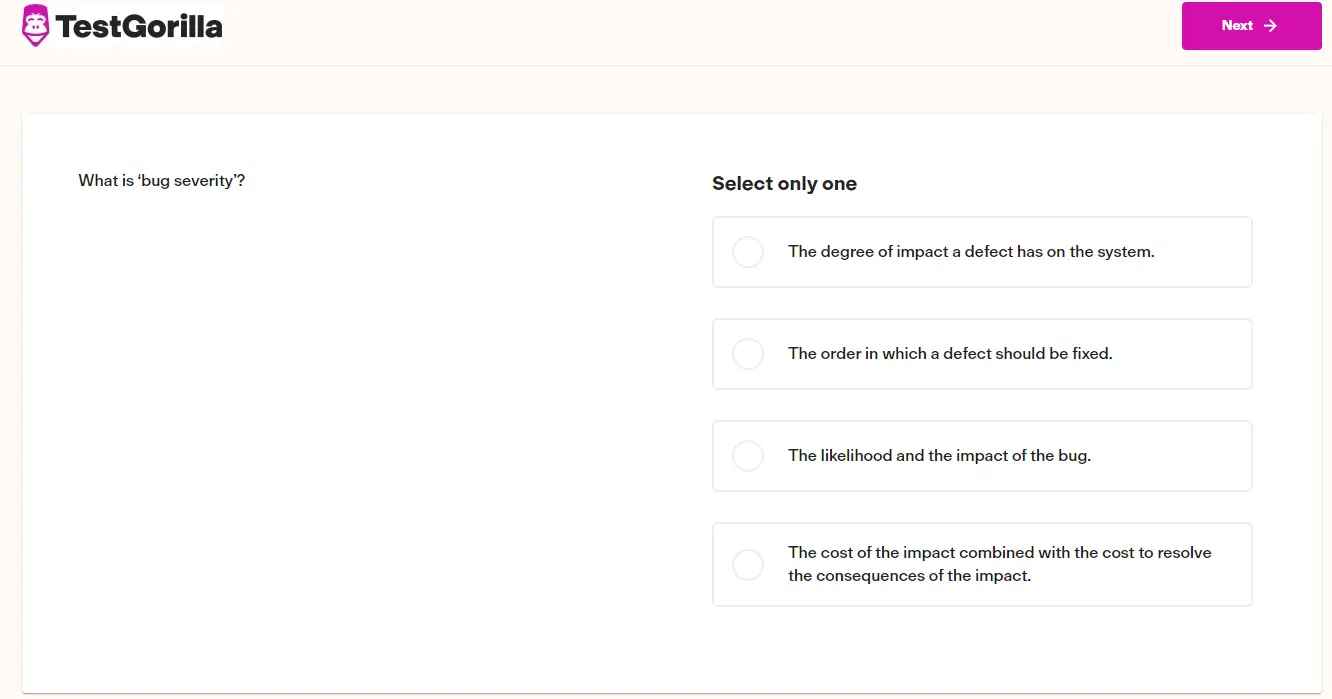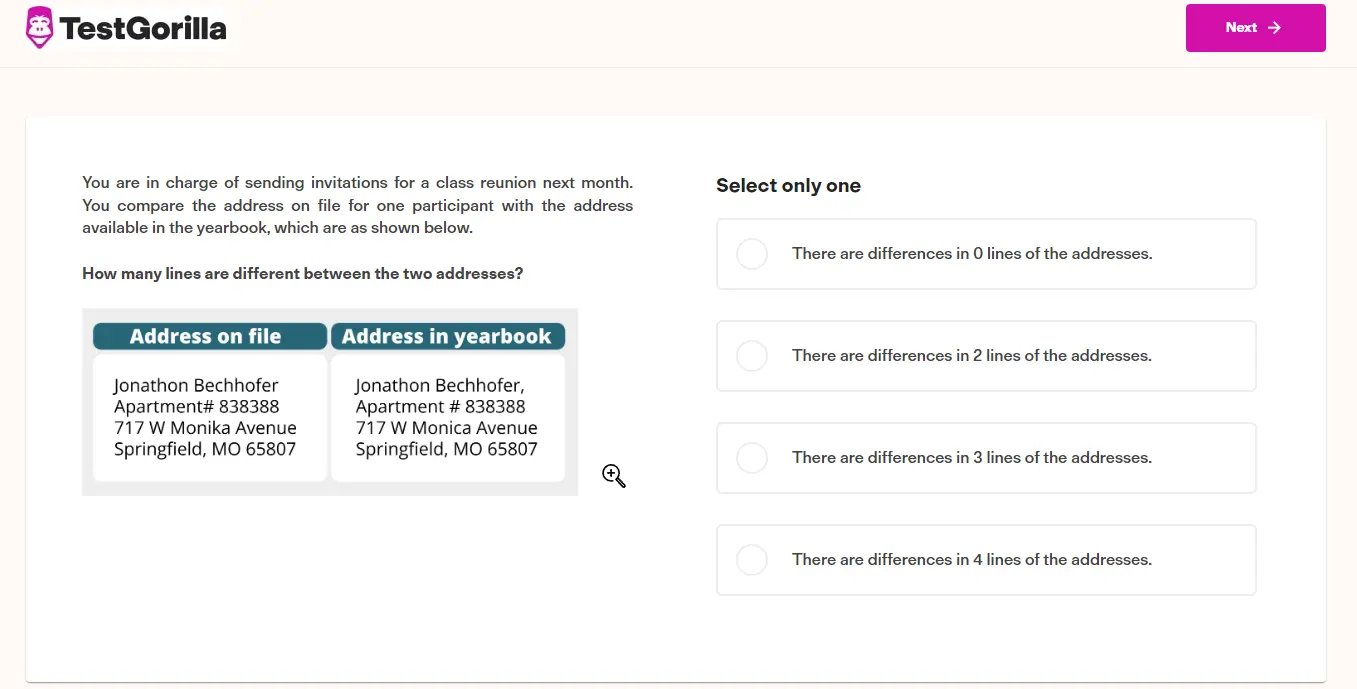Try the best quality assessment software for your hiring needs
Delivering high-quality software products is more critical than ever. A product with bugs or glitches harms your brand because it ruins customer trust and loyalty.
You can avoid costly mistakes and build a strong reputation for quality by hiring the right quality assurance (QA) team.
In this article, we show you the quality assurance skills you should be hiring for and how to use QA skills assessments to qualify candidates.
Table of contents
- Why are quality assurance skills important?
- 9 quality assurance skills and competencies
- How to assess QA skills and traits
- Summary: The 9 top QA skills and how to test for them
- How to develop QA skills
- Hire candidates with the most important quality assurance skills for your workforce
- Quality assurance skills FAQs
Why are quality assurance skills important?
Quality assurance skills are important because they prevent errors and defects and ensure a quality product that brings customers back for more. Your brand’s reputation and financial future are on the line.
In the past, brands let the customer test the product by using it instead of applying quality management systems and metrics.
This practice is outdated, lazy, and potentially even dangerous. For example, CrowdStrike faced severe backlash for releasing a product that disrupted global commerce for a week.
It’s not just major tech firms and cybersecurity companies that need to worry about QA skills, though. Research shows that 80% of customers switched brands because of a poor customer experience – a direct result of poor quality assurance.
Screen for QA skills with TestGorilla
Getting started with TestGorilla is easy and 100% free. All you need to do is sign up and start planning your quality assurance assessment.
9 quality assurance skills and competencies
We’ve boiled the hiring process down to nine essential QA engineer skills.
These nine skills are crucial to finding an analyst who is effective at upholding the quality standards and the technical portions of their job. These competencies also point to the interpersonal finesse and attention to detail needed for this role.
1. Ability to run tests
The main role of a QA employee is to run assessments like manual testing, regression testing, performance testing, and automation testing.
As such, they need hard skills to use testing tools and write scripts to automate repetitive testing tasks to ensure product quality. Examples include:
Selenium
Appium
Cypress
If these tools and techniques are unfamiliar, you can directly assess candidates for these skills with a QA assessment test like TestGorilla’s QA Tester test.
This assessment tests candidates’ ability to apply general testing and QA process knowledge, manage projects, and understand test execution methods and tools.
2. Scripting and programming
A quality assurance analyst also needs basic knowledge of scripting languages (like Python and JavaScript) or programming languages (like Java and C#) to create automated test scripts and understand the codebase.
While your new hire doesn’t need to be a proficient coder, a basic understanding of code helps them understand what might be causing the issues and communicate that with your dev team members to ensure quality control.
Asking candidates about their knowledge of scripting and programming languages is an important quality assurance interview question while assessing them for the job.
3. SQL and database management
SQL and database management are important quality assurance skills, especially when working with data-driven applications.
Your QA specialist must be able to write SQL queries to validate data integrity, perform backend testing, and ensure that the database functions correctly within the application. Without these essential skills, they can’t perform their job.
SQL proficiency enhances a QA’s ability to identify defects and empowers them to take the reins on the overall quality assurance process.
4. Project management
Software releases are often on tight deadlines, and being able to manage multiple tests, documentation, and communication across departments is important.
Critical project management skills include expertise in the following frameworks:
Project management software like JIRA
Project management techniques like Scrum
A QA engineer with strong project management can better align testing processes with overall project goals, improve efficiency, and contribute to delivering high-quality products on time — everything your company needs.
5. Motivation
Motivation is a crucial skill for a QA Engineer, and it's not just about being driven — it's about being driven by the right factors.
A QA must be motivated by the challenge of identifying and resolving quality issues, not just completing tasks. When your QA’s motivation aligns with the core demands of the role, it enhances their effectiveness and commitment, ultimately leading to a higher-quality product.
6. Cultural add
Finding the right cultural add for any role is important, especially for a quality assurance analyst. The QA role interacts with everyone in the company, from sales and marketing to product developers and stakeholders.
It quickly becomes apparent if they aren’t a good addition to your company culture.
Good cultural add candidates bring more benefits to your company, including:
Thriving QA teams
A strong workplace environment
A boost in productivity
Moreover, a study found that 70% of employees are "not engaged" or "actively disengaged" at work, which costs the U.S. between $450 bn and $550 bn each year in lost productivity.
7. Critical thinking & problem-solving
QA professionals must think critically and creatively when facing challenges. Thinking outside the box, analytical skills, and developing new approaches to problems are invaluable.
A proficient QA professional should be able to quickly diagnose problems, weigh the pros and cons of potential solutions, and settle on the optimal one.
8. Communication (written & verbal)
QA professionals need to identify, document, and explain product issues to others on the QA team and end users within the organization so someone can resolve them. They also need to be able to explain to shareholders the importance of resolving these issues in a high-level, non-technical way.
For this reason, QA professionals must have excellent written and verbal communication skills. They must be able to explain issues to teammates tactfully, empathetically, and respectfully. Careful communication avoids conflict when working on tasks and ensures a more positive, productive work environment.
9. Attention to detail
QA analysts must be willing to go through code line by line, testing every little thing – potentially even obscure things that most people wouldn’t do, like using an uncommon browser or entering an excessive amount of text into a form field – to find bugs.
They are also involved in many daily calls, emails, chats, and interactions with their team to ensure customer satisfaction. To prevent oversight, these professionals must have strong attention to detail.
Other tasks that require a keen attention to detail include:
Handling large volumes of information to discover what someone else may have missed
Recognizing even the most minor errors
Noticing minute nuances
Helping improve products and services for stakeholders and customers
Attention to detail saves the company money, too. QA professionals spot issues before they snowball into costly disasters.
The best insights on HR and recruitment, delivered to your inbox.
Biweekly updates. No spam. Unsubscribe any time.
How to assess QA skills and traits
Assessing quality assurance skills can be difficult and time-consuming.
Often, candidates are boot camp graduates, entirely self-taught, or have completed education in global systems that can be challenging to evaluate or verify for quality.
At TestGorilla, we’ve spent years developing QA assessment tests so you can confidently hire your first QA engineer.
Evaluating for quality assurance gives you a more thorough understanding of each candidate than simply checking their resume or cover letter.
Our tests are unbiased and give you an objective understanding of each candidate's skill set, from engineering and SQL skills to soft skills like communication and attention to detail. Here’s a summary:
Quality assurance skill | Example in the workplace |
QA engineering skills | Troubleshoot and fix technical issues |
SQL skills | Perform SQL queries and join tables |
Agile testing skills | Use methodologies like SCRUM |
Communication skills | Simplify technical jargon |
Attention to detail skills | Find minute errors in code and test automation |
1. QA engineering skills
Throughout a product’s lifecycle, a good QA employee is there to recognize, troubleshoot, and fix technical and functional issues that may arise, so the product meets customer, company, and industry expectations and guidelines.
The QA Tester test from TestGorilla tests a candidate’s ability to understand and implement testing methods. It also measures their ability to apply project management knowledge to QA processes and effectively communicate across teams, using questions like the one below:
People who pass this test know how to apply general testing and QA process knowledge, use project management capabilities, and understand test execution methods and tools.
2. SQL skills
Structured Query Language (SQL) is a standard programming language designed to manage and manipulate relational databases. QA analysts often rely on SQL to ensure that the data stored in these databases aligns with the expected outcomes when testing applications.
Given the importance of databases in most applications, assessing these important skills is essential for QA roles.
When hiring a QA engineer, you should evaluate their ability to perform basic SQL queries, like joining tables, filtering data, and writing subqueries. You can assess these skills using TestGorilla’s SQLite Online Coding test, which evaluates the knowledge of entry-level SQL queries.
3. Agile testing skills
Agile methodologies are crucial to fast-moving software development. The most relevant methodologies to assess your candidates for include:
Scrum
Kanban
Lean Software Development
TestGorilla’s SCRUM Master test lets you verify applicants’ skills in this area.
For a QA, it’s not enough to know what these terms mean – it's about properly using them to ensure rapid, high-quality product releases.
When you assess agile skills, you know that your candidate can effectively execute these methodologies.
Screen for candidates with exceptional QA skills
TestGorilla has spent years crafting and refining assessment tests to objectively qualify candidates so you don’t waste money on poor hires. To supercharge your screening process, explore our QA skill tests in the demo.
4. Communication skills
An effective QA professional must have strong communication skills to ask the right questions and facilitate resolution and teamwork.
Communication needs are different depending on who the QA is interacting with. Coders need specific details of what is broken, yet stakeholders need high-level, simplified overviews that leave out the jargon and nitty gritty.
TestGorilla’s Communication Skills test assesses candidates’ ability to understand and interpret written communication, actively listen, and reiterate information clearly and concisely.
5. Attention to detail
Extreme attention to detail is a crucial quality assurance skill. Your QA team must pore over every line of code and methodically try to break the product to find every error. They also need to document the steps taken to create the break so the developers can figure out what went wrong and fix it.
TestGorilla’s Attention to Detail (textual) test is designed to determine whether or not a candidate pays attention to tiny details. Candidates encounter scenarios that test their data matching, filtering, comparison, and item consistency skills.
This test uses questions like the one below:
Start screening for crucial QA skills
Create a thorough QA assessment with TestGorilla’s comprehensive library, covering everything from coding skills to problem-solving aptitude.
Summary: The 9 top QA skills and how to test for them
Here are the nine essential QA skills and the associated skills tests you can use to assess QA skills before hiring.
QA skills | How to test for them |
1. Ability to Run Tests | QA Tester test |
2. Scripting and Programming | |
3. SQL and Database Management | SQLite Online Coding test |
4. Project Management | Scrum Master test |
5. Cultural Add | |
6. Motivation | Motivation test |
7. Critical Thinking and Problem Solving | Problem Solving test |
8. Written and Verbal Communication | Communication Skills test |
9. Attention to Detail | Attention to Detail (Textual) test |
How to develop QA skills
Whether you are learning to become a QA specialist or a hiring manager looking to train a new QA hire, there are ways to develop QA skills.
Learn the basics of programming and SDLC
Take online courses like the International Software Testing Qualifications Board
Read books and blog posts focused on quality assurance specialist skills
Practice manual testing on random websites such as e-commerce stores or apps
Familiarize yourself with tools like JIRA and Bugzilla
Learn SQL and practice with databases
Stay up to date on QA industry trends and network with QA professionals on boards like LinkedIn
It’s important to continue learning, even after you break into the QA field because whoever stops learning gets left behind in the QA space.
Hire candidates with the most important quality assurance skills for your workforce
Hiring a QA specialist is no easy task. The QA candidate needs a complex quality assurance skill set, technical knowledge, strong attention to detail, and the ability to audit and document everything. These aren’t skills that can be proven on an application or in a resume.
Luckily, TestGorilla has made it easy to assess QA candidates using skills assessments that prove qualifications beyond the resume or cover letter. You can use our customizable QA analyst job description template to reel in top applicants!
If you’re wondering how to hire specialists with the best quality assurance skills, sign up for a free demo.
You can also take a look at our free product tour to see for yourself how easy it is to hire the right applicant.
If you’re ready to start, sign up for our Free forever plan and dive right in.
Quality assurance skills FAQs
Still have questions? Here are the answers to questions people frequently ask about hiring a QA team.
What are the top 3 QA skills?
The three essential QA skills are testing knowledge, attention to detail, and communication. Without these three skills, a QA cannot succeed in their role. Beyond performing the technical requirements of testing the product, a QA must be able to document exactly what caused a bug or break and communicate that process to both the dev team and the executive suite.
Is QA a technical skill?
Yes, quality assurance (QA) is a technical skill. The role requires deep technical knowledge of the product, advanced project management skills like Scrum and Kanban, and the ability to document and communicate complex processes and initiatives. The role is constantly evolving – quality assurance professionals must stay current with the latest technology trends and industry standards to stay relevant.
What is a QA (quality assurance) skills assessment?
A QA skills assessment evaluates individuals’ knowledge of QA practices and ability to perform QA-related tasks. It tests candidates’ technical, analytical, leadership, communication, and problem-solving skills to gauge their ability to detect and correct errors and problems. Companies can use QA skills assessments to evaluate software test engineers and their knowledge of QA methods, project management and communication skills, and problem-solving and time management abilities.
You've scrolled this far
Why not try TestGorilla for free, and see what happens when you put skills first.






















